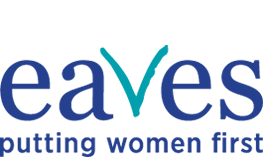A Tiny Protest
to Influence the New Modern Slavery Bill

Eaves, the UK’s leading charity supporting female victims of trafficking, has launched a new campaign ‘A Tiny Protest’ calling for major reforms to be included in a Modern Slavery Bill the government is currently drafting.
Spearheading the campaign is Eaves supporter, Skin from the Band Skunk Anansie, with other high-profile backers including Stephen Fry, Alan Carr, Jo Brand and Stephen Merchant.
Globally some 2.4 million people are estimated to be trafficked annually. It is the world’s second most profitable crime. In the UK, trafficking remains a largely hidden crime with few victims coming to the attention of authorities. Last year officials believe they found just over 2,000 victims in the UK but experts believe the real numbers may be much higher.
A Modern Slavery Bill is being drawn up to address the problem in the UK. Eaves supports the Bill but is launching a campaign to improve how some victims are treated when they come to the attention of authorities. The charity has found victims in prisons and detention centres rather than receiving support and justice.
One of the key problems the charity believes lies in whose job it is to formally identify victims. Those with a European nationality are identified by the UK Human Trafficking Centre based in the National Crime Agency; but those from outside the EU are formally identified by the UK Immigration and Visa service (UKVI).
The charity believes UKVI may have a conflict of interest as it is tasked with safeguarding the UK’s borders, which is likely to make the agency more skeptical in accepting that someone is a victim of trafficking. The charity is also concerned about victims of trafficking sentenced to prison for crimes their traffickers made them commit.*
The campaign is calling for seven key principles to be incorporated in the Bill:
1.Victims should be identified and treated in the same way wherever they are from in the world.
2. Victims should not be imprisoned or detained as a result of crimes their traffickers forced them to commit.
3. Victims should have at least 90 days access to legal, health and resettlement services.
4. Where victims choose to return home; steps should be taken to keep them safe and help given to rebuild their lives.
5. Victims have a right to compensation which should include funds from the confiscated assets of traffickers.
6. Victims have a right to justice and should expect crimes against them to be investigated whenever they took place.
7. The government proposed Anti-Slavery Commissioner should be politically independent and have the authority to hold officials to account.
Many victims of modern day slavery find themselves forced into domestic work, prostitution, drug cultivation, criminal activities or forced into marriages. Some of the few victims who have managed to escape from their brutal experiences then find themselves fighting another battle to get authorities to believe them and access the support they need.
Eaves is encouraging the public to go to the campaign website www.tinyprotest.org select a principle and tweet it to number 10 Downing Street or create their own virtual protester.
Dorcas Erskine who runs the Poppy Project, Eaves’ anti- trafficking programme says:
“A lot of the women we have supported often face two nightmares for which it seems they will never wake- the brutality of the slavery like conditions their traffickers have imposed on them; and then post escape, getting officials to believe them or even worse, finding themselves imprisoned for crimes their traffickers forced them to commit.”
“I think if it is your job to keep border control then naturally you are going to look at things differently than someone whose job is to investigate crimes like trafficking. The indicators of trafficking are often there but victims, especially those from outside the EU face an uphill struggle convincing officials whose job it is to maintain border control that they are actually victims.”
*Kim, a victim, who had false documents was used as a domestic and sex slave by a criminal gang involved in cannabis cultivation. Following a police raid, she found herself sentenced alongside her traffickers for drug offences. Kim received support from Eaves Poppy Project who managed to convince the immigration service that she was as a victim of trafficking, but the Judge refused to take her trafficking situation into account. Instead she had to sit in the dock with her traffickers who made threatening comments to her during the trial and spent many months in prison until Eaves was able to successfully appeal her conviction and secure her release.
www.tinyprotest.org
How you can help Get inspired with fundraising ideas or join one of our fundraising events...
Sign up for our newsletter Stay up to date with our supporters, campaigns and consultations...
Our success stories
Molly, 38 from London
3rd May 2012
Molly* says… “When I was 38, I was raped and beaten by my boyfriend. He turned my life upside down and it… read more
Maria, 23 from Greater London
3rd May 2012
Maria* says… “I first came to Eaves’ Scarlet Centre just before Christmas after my boyfriend’s friend… read more


